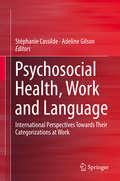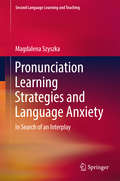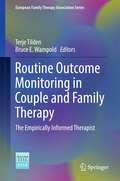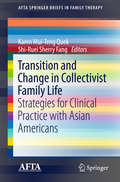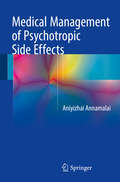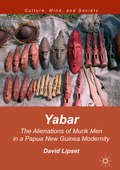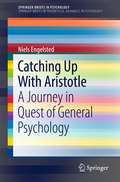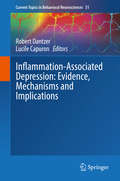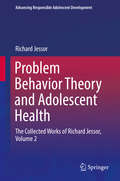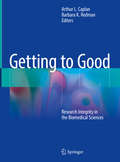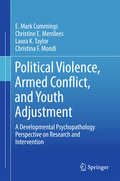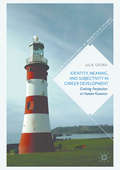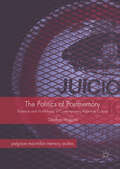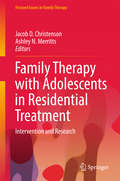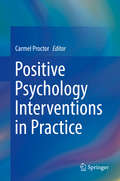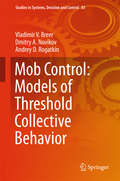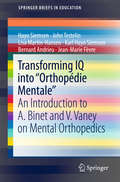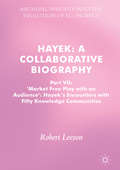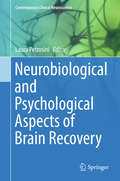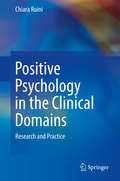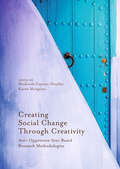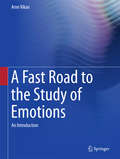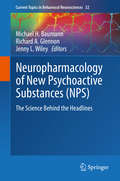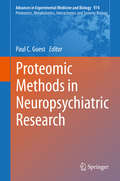- Table View
- List View
Psychosocial Health, Work and Language
by Stéphanie Cassilde Adeline GilsonThis volume deals with the construction of categorizations of health at work on the basis of individuals' perceptions and analyses of the psychosocial health effects at their work. The volume approaches the subject from the point of view of those who have experienced psychosocial risks at work, either by being under constraints themselves or by being witness to such constraints. Each chapter sheds light on their representations by examining how the individuals label these constraints. The book compares official categorizations of psychosocial health effects of work to unofficial categorizations, built or expressed. It shows how taking into account subjective narratives may reinforce existing strategies. By giving a central place to language in the analysis of the representations of psychosocial health at work, the volume provides additional information about the various prevention and coping strategies that can be used for dealing with the issue. Beyond some international comparisons, the book covers various national case studies, including in Argentina, Belgium, Canada, Chechnya, France, Germany, the Netherlands, Japan, and Russia.
Pronunciation Learning Strategies and Language Anxiety
by Magdalena SzyszkaThis book presents theoretical considerations and the results of empirical research on pronunciation learning strategies (PLS) deployed by pre-service trainee teachers majoring in English as a foreign language who experienced different levels of language anxiety (LA). The theoretical part focuses on the concepts of pronunciation learning, pronunciation-learning strategies and language anxiety and includes an overview of recent empirical research dealing with various related issues. The empirical section of the book presents the findings of a research project that investigated the interplay between PLS and LA, in which both quantitative and qualitative data were collected. Based on the findings, the author proposes two profiles of anxious and non-anxious EFL trainee teachers who support their pronunciation learning with an array of pronunciation learning strategies and tactics.
Routine Outcome Monitoring in Couple and Family Therapy
by Bruce E. Wampold Terje TildenThis research-to-practice manual introduces Routine Outcome Monitoring (ROM), a feedback-based approach to preventing impasses and relapses in couple and family therapy as well as within other psychotherapy approaches. This book discusses how ROM has been developed and experienced within the Norwegian couples and family therapy community in line with international trends of bridging the gap between clinical practice and research. Locating the method in evidence-based systemic practice, contributors describe the core techniques, tools, and process of ROM, including examples of effective uses of feedback over different stages of therapy, with individuals in family context, and implemented in different countries. Giving clients this level of control in treatment reinforces the concept of therapy as a collaborative process, fostering client engagement and involvement, commitment to treatment, and post-treatment progress. ROM is applicable across clinical settings and clinician orientations for maximum utility in work with clients, and in building therapeutic self-awareness. Features of the book: *Theoretical and empirical context for using ROM with families and couples. *Tools and procedures, including the Systemic Therapy Inventory of Change. *Guidelines for treatment planning, implementation, and evaluation. *Common challenges in using ROM with couples and families. *Supervisory, training, and ethical issues. *Examples and vignettes showing ROM in action. With its deep potential for promoting client progress as well as therapist development, Routine Outcome Monitoring in Couple and Family Therapy: The Empirically Informed Therapist will attract practitioners and research professionals particularly interested in clinical practice, client-directed methods, and couple or family therapy.
Transition and Change in Collectivist Family Life: Strategies for Clinical Practice with Asian Americans (AFTA SpringerBriefs in Family Therapy)
by Karen Mui-Teng Quek Shi-Ruei Sherry FangThis research-to-practice volume grounds clinicians in a robust, culturally-informed framework for conducting effective therapy with Asian-American couples, families, and individuals. Family, cultural, social, and spiritual dynamics are explored across ethnicities, generations, relationships, and immigrant/citizen experience to reflect a diverse, growing population. Discussion and case examples focus on contrasts, conflicts, and balances involved in acculturation and change, notably the shift from collectivist cultural tradition to a more independent view of the self, gender, choices, and relationships. The contributors’ finely shaded guidance and accessible approach will help therapists provide appropriate services for Asian-American clients without minimizing or pathologizing their experiences.Included in the coverage:How Asian American couples negotiate relational harmony: collectivism and gender equality.Through religion: working-class Korean immigrant women negotiate patriarchy.The role of Chinese grandparents in their adult children’s parenting practices in the United States.Balancing the old and the new: the case of second generation Filipino American women.Bicultural identity as a protective factor among Southeast Asian American youth who have witnessed domestic violence. Transition and Change in Collectivist Family Life is a cogent clinical resource for practitioners and mental health professionals with interests in Asian-American family therapy, psychotherapy, collectivism, and faith-based community and counseling.
Peacebuilding in Deeply Divided Societies
by Timothy D. Sisk Fletcher D. CoxThis book explores a critical question: in the wake of identity-based violence, what can internal and international peacebuilders do to help "deeply divided societies" rediscover a sense of living together? In 2016, ethnic, religious, and sectarian violence in Syria and Iraq, the Central African Republic, Myanmar, and Burundi grab headlines and present worrying scenarios of mass atrocities. The principal concern which this volume addresses is "social cohesion" - relations within society and across deep divisions, and the relationship of individuals and groups with the state. For global peacebuilding networks, the social cohesion concept is a leitmotif for assessment of social dynamics and a strategic goal of interventions to promote resilience following violent conflict. In this volume, case studies by leading international scholars paired with local researchers yield in-depth analyses of social cohesion and related peacebuilding efforts in seven countries: Guatemala, Kenya, Lebanon, Nepal, Nigeria, Myanmar, and Sri Lanka.
Medical Management of Psychotropic Side Effects
by Aniyizhai AnnamalaiThis book is a practical guide for psychiatrists to use when treating patients for medical issues. Over the past 10-20 years, the number of medications prescribed for psychiatric illnesses has steadily increased, and psychiatric practitioners are frequently called upon to manage medical issues and side effects that result from psychotropic treatment. Covering a wide range of conditions from thyroid disorders to cardiac disease, this book is a helpful resource for understanding common adverse medical effects that occur when psychotropic drugs are administered. Presented in a practical format, each chapter discusses management of a particular medical problem or side effect and then provides a summary and flowchart of the major points highlighted in that chapter. Each chapter contains an overview of key medications causing a particular side effect. The book also includes special topics such as psychotropic prescribing in medical illness and tips on electrocardiographic interpretation. This easy-to-reference book aims to bridge the gap between medicine and psychiatry by elaborating on medical conditions seen in routine outpatient psychiatric practice. It serves as an invaluable tool for mental health providers, nurses, health educators, and pharmacologists alike.
Yabar
by David LipsetThis book analyses the dual alienations of a coastal group rural men, the Murik of Papua New Guinea. David Lipset argues that Murik men engage in a Bakhtinian dialogue: voicing their alienation from both their own, indigenous masculinity, as well as from the postcolonial modernity in which they find themselves adrift. Lipset analyses young men's elusive expressions of desire in courtship narratives, marijuana discourse, and mobile phone use--in which generational tensions play out together with their disaffection from the state. He also borrows from Lacanian psychoanalysis in discussing how men's dialogue of dual alienation appears in folk theater, in material substitutions--most notably, in the replacement of outrigger canoes by fiberglass boats--as well as in rising sea-levels, and the looming possibility of resettlement.
Catching Up With Aristotle: A Journey in Quest of General Psychology (SpringerBriefs in Psychology)
by Niels EngelstedThis Brief presents the argument for the need to re-establish the theoretical focus of general psychology in contemporary psychological research. It begins with a detailed account of the current "crisis" of psychology and our modern disconnect from general psychology. Chapters present the works of Aristotle and A. N. Leontiev, using their ideas to outline a long wanted general psychology. The general psychology delineates the four corner posts of the domain of psychology: Sentience, Intentionality, Mind, and Human Consciousness, and explains why they are all necessary but not the same. Besides a historical discussion, which aims to demonstrate how Marxism got it right, and then not, this Brief presents a new radical theory of human evolution, which credits the Adam-and-Eve story with a vital link hitherto missed by Marxism, Darwinism, and paleoanthropology. In addition, it argues why a new understanding is important in the Anthropocene Age. Catching Up with Aristotle will be of interest to psychologists, undergraduate and graduate students, and researchers.
Inflammation-Associated Depression: Evidence, Mechanisms and Implications
by Robert Dantzer Lucile CapuronInflammation has invaded the field of psychiatry. The finding that cytokines are elevated in various affective and psychotic disorders brings to the forefront the necessity of identifying the precise research domain criteria (RDoCs) that inflammation is responsible for. This task is certainly the most advanced in major depressive disorders. The reason is that a dearth of clinical and preclinical studies has demonstrated that inflammation can cause symptoms of depression and conversely, cytokine antagonists can attenuate symptoms of depression in medical and psychiatric patients with chronic low grade inflammation. Important knowledge has been gained on the symptom dimensions that inflammation is driving and the mechanisms of action of cytokines in the brain, providing new targets for drug research and development. The aim of the book "Inflammation-Associated Depression" is to present this field of research and its implications in a didactic and comprehensive manner to basic and clinical scientists, psychiatrists, physicians, and students at the graduate level.
Problem Behavior Theory and Adolescent Health
by Richard JessorThis second volume of Richard Jessor's influential works applies his groundbreaking theory to illuminating the psychosocial determinants of adolescent health. Focusing on a range of both health-compromising and health-enhancing behaviors, including problem drinking, marijuana use, risky driving, and early sexual experience as well as regular exercise and healthy diet, these writings advance understanding of the role of health behavior in adolescence and adolescent development. Chapters illustrate the relevance of the theory and of its interdisciplinary approach for research on behavioral health in adolescence and for the design of prevention/intervention programs to promote healthy development. In addition, the book's comparative studies of U. S. and Chinese youth reveal the generality of the theory across societal and national differences. Topics featured in this book include: Alcohol use and problem drinking in adolescent health and development. Psychosocial research on marijuana use. Understanding early initiation of sexual intercourse in adolescence. Smoking behavior in adolescence and young adulthood. Developmental change in risky driving. Healthy eating and regular exercise in adolescent health and development Problem Behavior Theory and Adolescent Health is a must-have resource for researchers, professors, clinicians, and related professionals as well as graduate students in developmental and health psychology, sociology, criminology, criminal justice, public health, and related disciplines.
Getting to Good: Research Integrity In The Biomedical Sciences
by Barbara K. Redman Arthur L. CaplanThis book represents the first comprehensive, gold standard reader on research integrity in the biomedical sciences. Now more than ever, the responsible conduct of research (RCR) has become critically important as new technologies affect research practices in both positive and negative ways. Since learning to do science and practicing it brings researchers into contact with a vast array of ethical issues, it is critical to know the standards and how they are evolving. Indeed, research integrity requires scientists at all levels to operate ethically in a system that supports ethical practice. This unique, foundational text covers all the relevant areas -- subject protection, research misconduct and conflict of interest as well as newly quantified concerns about research bias and non-reproducibility, as well as other unique issues. Developed by renowned experts, this compelling title discusses the full range of practices and policies that should support research that is honestly produced and disseminated. It also specifically incorporates topics noted by the National Institutes of Health as essential and required for training in RCR. Getting to Good – Research Integrity in the Biomedical Sciences is a major contribution to the literature on bioethics and will serve as an invaluable resource for all researchers, students, administrators and professionals interested in research ethics and integrity.
Political Violence, Armed Conflict, and Youth Adjustment
by E. Mark Cummings Christine E. Merrilees Laura K. Taylor Christina F. MondiThis book reviews and critiques the growing literature on youth development under conditions of political violence and armed conflict. It presents a robust framework, based in developmental psychopathology, for evaluating current research on this topic for strength of design, methodology, and documentation. Cross-sectional and longitudinal studies from diverse regions and conflicts as well as across disciplines examine risks and challenges as well as resilience and coping as youth develop in unstable and threatening environments. In addition, this book provides strategies for designing and implementing prevention and intervention programs as well as further opportunities for expanding applied research for youth exposed to political violence and armed conflict. Topics featured in this book include: Analysis of major research on youths' normative and pathological development during political violence and war. Guidelines for assessing research studies on the impact of political violence and armed conflict on youth. The effects of social ecology factors (e. g. , family, school, and community) on youth functioning. Post-traumatic stress disorder. Trauma-Focused Cognitive-Behavioral Therapy. Political Violence, Armed Conflict, and Youth Adjustment is a must-have resource for researchers, professors, clinicians/professionals, and graduate students in the fields of child and school psychology, family studies, and public health as well as developmental psychology, child and adolescent psychiatry, political science, anthropology, social and peace psychology, sociology, and ethnic studies.
Identity, Meaning, and Subjectivity in Career Development
by Julie GedroThis book closely interrogates the construct of identity and the role it plays in career development. It provides guidance for HRD practitioners and researchers who create career development programs through a typology of different categories of identity, such as demographics, life events, and career histories. The book presents a framework for considering and addressing career development from a critically reflective perspective of identity as a result of choice, chance, and adaptation. It offers a comprehensive understanding and awareness of tacit, nuanced, and stigmatized issues that were once shameful but have now become more socially acceptable. As a result, HRD practitioners can design programs and resources that have a richness and relevance that might heretofore be lacking. The book also offers guidance for individuals as they take charge of their own identities and career trajectories in an increasingly complex and unpredictable working environment.
The Politics of Postmemory
by Geoffrey MaguireThis volume examines recent examples of Argentine literature, film, theatre and visual art from the children of the disappeared. By exploring their creative narration of childhood memories and the controversial use of parody, humour and fantasy, Maguire considers how this post-dictatorship generation are increasingly looking towards the past in order to disrupt the politics of the present. More broadly, this interdisciplinary study also scrutinizes the relevance of postmemory in a Latin American context, arguing that the politics of local Argentine memory practices must be taken actively into account if such a theoretical framework is to remain a productive and appropriate analytical lens. The Politics of Postmemory thus engages critically with theories of cultural memory in the Argentine, Latin American and global contexts, resulting in a timely and innovative text that will be of significant interest to students and scholars in the fields of, among others, cultural studie s, film studies, critical theory and trauma studies.
Family Therapy with Adolescents in Residential Treatment: Intervention and Research (Focused Issues in Family Therapy)
by Jacob D. Christenson Ashley N. MerrittsThis highly practical resource integrates the powerful dynamics of family into residential treatment and outdoors-based therapy for young people. Recognizing both the family as the systemic base for promoting change in adolescents and the therapeutic potential of the residential/wilderness setting, experts show how aligning the two can enhance the healing value of the program while promoting higher standards for care. Chapters describe innovative, science-based interventions and techniques for treating common behavioral and emotional problems along a continuum of family involvement and separation, to address issues affecting the family as well as the identified patient. With its accessible ideas and compelling case studies, the book ably demonstrates the critical role of family in adolescent patients’ successful transition to post-treatment life. Among the topics covered:• A parallel process: home therapy while the adolescent or young adult is in residential care.• Intentional separation of families: increasing differentiation through wilderness therapy.• Emerging family therapy models utilized in residential settings.• Engaging families in Outdoor Behavioral Healthcare.• Research on coping skills used by youth with emotional and behavioral disorders.• Expanding our understanding of the place of family therapy in residential treatment.Family Therapy with Adolescents in Residential Treatment offers novel, exciting, and effective strategies and techniques for practitioners and mental health professionals particularly interested in family therapy with adolescents, and in related interventions and research.
Positive Psychology Interventions in Practice
by Carmel ProctorThis book presents recent advancements in positive psychology, specifically its application across broad areas of current interest. Chapters include submissions from various international authors in the field and cover discussion and presentation of relevant research, theories, and applications. The volume covers topics such as CBT, Psychotherapy, Coaching, Workplaces, Aging, Education, Leadership, Emotion, Interventions, Measurement, Technology, Design, Health, Relationships, Experiences, Communities. With the growing interest in the applications of positive psychology across diverse fields within psychology and beyond, this book will make a worthwhile contribution to the field. It will also fill the current need for a volume that highlights specifically the various recent advancements in positive psychology into diverse fields and as such will be of benefit to a wide range of professionals, including psychologists, educators, clinicians, therapists, and many others.
Mob Control: Models of Threshold Collective Behavior
by Vladimir V. Breer Dmitry A. Novikov Andrey D. RogatkinThis book presents mathematical models of mob control with threshold (conformity) collective decision-making of the agents. Based on the results of analysis of the interconnection between the micro- and macromodels of active network structures, it considers the static (deterministic, stochastic and game-theoretic) and dynamic (discrete- and continuous-time) models of mob control, and highlights models of informational confrontation. Many of the results are applicable not only to mob control problems, but also to control problems arising in social groups, online social networks, etc. Aimed at researchers and practitioners, it is also a valuable resource for undergraduate and postgraduate students as well as doctoral candidates specializing in the field of collective behavior modeling.
Transforming IQ into “Orthopédie Mentale“: An Introduction to A. Binet and V. Vaney on Mental Orthopedics (SpringerBriefs in Education)
by Hayo Siemsen John Testelin Lisa Martin-Hansen Karl Hayo Siemsen Bernard Andrieu Jean-Marie FèvreThis volume discusses Alfred Binet’s works on pedagogy based on his “Orthopédie Mentale”. Binet had empirically found that his idea of a test of general intelligence could be replaced by a test on “problem areas”. These problem areas were then to be specifically addressed and improved within a relatively short time. As a result, students dramatically improved in their IQ test results. Binet died before he could publish the results. Fortunately, the rector of the school, Victor Vaney, published the results of Binet’s experiments in his school. This volume provides the first English translation of Vaney's publication as well as an introduction to Binet's mostly forgotten late work.
Hayek: Part VII, 'Market Free Play with an Audience': Hayek's Encounters with Fifty Knowledge Communities (Archival Insights into the Evolution of Economics)
by Robert LeesonThis book is the seventh volume in this series which explores the life of Nobel Price-winning economist F.A. Hayek (1899-1992). The volume uses archival material, juxtaposed with Hayek’s published work to challenge the existing perceptions of his life and thought. It examines the methods by which Hayek interacted with – and schemed against – the knowledge communities that he encountered during his very long life. Chapters explore the ‘rules of engagement’ that Hayek employed when interacting with fifth leading knowledge communities, including the Nobel Prize selection committee who were led to believe his claim about having predicted the Great Depression. It also explores his interactions with William Beveridge, the founder of the modern British Welfare State, A. C. Pigou, the founder of the market school, J. M. Keynes, Sir Arthur Lewis, and Abba Lerner.
Neurobiological and Psychological Aspects of Brain Recovery (Contemporary Clinical Neuroscience)
by Laura PetrosiniThe novelty of this book's approach lies in addressing the impact of neurobiological factors as well as psychological influences on brain recovery. There is growing evidence that emotional, motivational, and cognitive factors along with personality traits play a crucial role in brain plasticity, resilience, and recovery. Topics include synaptic and neuronal plasticity, development of brain reserves, biological markers, environmental factors, psychological profile, emotional resilience, and personality traits. By combining the latest research on neural mechanisms and on psychological resilience the authors hope that this book can lead to the development of better treatment strategies for functional recovery from brain damage.
Positive Psychology in the Clinical Domains
by Chiara RuiniThis book builds the bridge between the fields of clinical and positive psychology research and practice. It presents a variety of interventions aimed at promoting positivity in clinical populations. Although clinical psychology has addressed issues such as happiness, resilience and optimal functioning, the field has stuck to the medical model and paid more attention to distress and negativity in human existence. Positive psychology, on the other hand, has been considered a "psychology for all" and has devoted attention and resources to the investigation of positivity in general populations, Only recently, the relationships between positivity, distress and psychopathology have been investigated. This book integrates research and practice from both fields. Its first part provides a theoretical framework for describing concepts such as hedonic and eudaimonic wellbeing, resilience, character's strengths, positive health and positive functioning, with a special reference to their clinical implications and their psychosomatic underpinnings. The second part provides a review of positive interventions in clinical practice and psychotherapeutic settings. These interventions are derived from positive psychology as well as from longstanding traditions in clinical psychology and psychiatry, and from eastern clinical and philosophical approaches.
Creating Social Change Through Creativity: Anti-Oppressive Arts-Based Research Methodologies
by Moshoula Capous-Desyllas Karen MorgaineThis book examines research using anti-oppressive, arts-based methods to promote social change in oppressed and marginalized communities. The contributors discuss literary techniques, performance, visual art, and new media in relation to the co-construction of knowledge and positionality, reflexivity, data representation, community building and engagement, and pedagogy. The contributors to this volume hail from a wide array of disciplines, including sociology, social work, community psychology, anthropology, performing arts, education, medicine, and public health.
A Fast Road to the Study of Emotions: An Introduction
by Arne VikanThis book is an ideal introduction to work in psychology and the neurosciences. Walking us through the key topics including historical, developmental and cultural perspectives, the book shows that the different types of emotions each is an evolved adaptive structure that serves a functional purpose. It is shown how these types are expressed differently on the human face, how they are developed in the child, and how they influence and are influenced by culture, health and the ways persons think and perceive. Knowledge of emotions is essential for anyone who plans to work, or whose work already involves, helping, instructing, negotiating, or controlling others. This introductory-level book teaches undergraduates as well as general readers the main components and methods, and helps readers to better understand how emotions operate both within the body and out in the world. It is a valuable resource for undergraduate students in psychology, nursing, social work, physiotherapy and occupational therapy find this book an important accompaniment.
Neuropharmacology of New Psychoactive Substances: The Science Behind the Headlines (Current Topics in Behavioral Neurosciences #32)
by Richard A. Glennon Michael H. Baumann Jenny L. WileyDesigner drugs, or new psychoactive substances (NPS), are synthetic chemicals that mimic the effects of classic drugs of abuse. There has been an alarming worldwide increase in the abuse of NPS in recent years. NPS are cheap, easy to obtain, and often legally available. In this volume, leading experts summarize the latest studies regarding the molecular mechanisms of action, behavioral effects, and adverse consequences of popular NPS. Specific chapters clarify the differences between various types of NPS, namely: stimulants, cannabinoids and hallucinogens. Thus, this volume broadens our understanding of NPS and provides insight into the rapidly evolving “new drug” phenomenon.
Proteomic Methods in Neuropsychiatric Research
by Paul C. GuestDue to continuous technical developments and new insights into the high complexity of neurological diseases, there is an increasing need for the application of proteomic technologies which can yield potential biomarker readouts for improved clinical management as well as for the development of new drugs by struggling pharmaceutical companies. This book describes the step-by-step use of proteomic methods such as two-dimensional gel electrophoresis, multiplex immunoassay, liquid chromatography mass spectrometry (LC-MS) and selective reaction monitoring MS, to increase our understanding of these diseases, with the ultimate aim of improving patient care. The volume will be of high interest to clinical scientists, physicians and pharmaceutical company scientists as it gives insights into the latest technologies enabling the revolution of personalized medicine. It is of direct interest to both technical and bench biomarker scientists as it gives step by step instructions on how to carry out each of the protocols. It is also of interest to researchers as each technique will be presented in the context of a specific neurological disorder, including Alzheimer's disease, multiple sclerosis, autism spectrum disorders, schizophrenia, major depressive disorder and bipolar disorder. Finally, it will also highlight the future research efforts in this field, which are endeavoring to convert proteomic platforms to the form of hand held devices which can be used in a point of care setting and return diagnostic results within the timeframe of a visit to the general practitioner.
